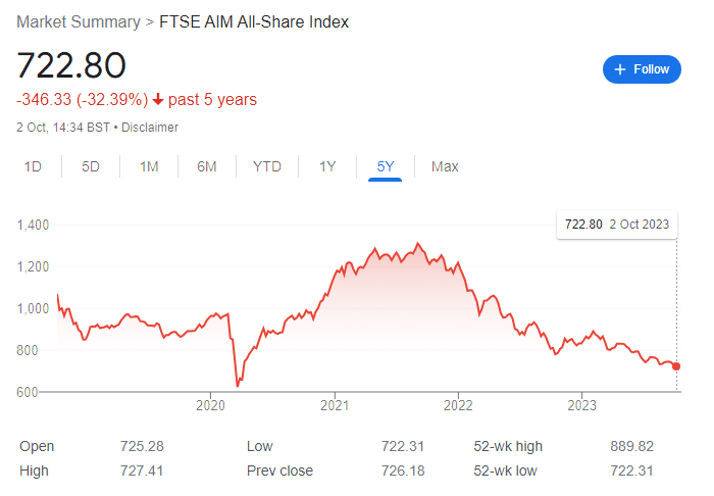There’s high risk, high reward — and then there’s blurring the lines between investing and gambling. Let’s dive in.

As an avid small cap investor, I like to conduct the occasional social poll on my followers.
This morning’s vote was to do with diversification — with the poll asking how many shares you held in your portfolio. Surprisingly (or not) depending on your philosophical perspective, 47% or nearly half of the 250 respondents are only invested into one stock, with the vast majority invested into just five shares or less.
What’s potentially even more surprising is that this dependency on only one, or simply a handful of shares, also transcribes into the blue chip space. InvestingReviews’ 2023 annual report shows that 46% of panel respondents had only 1-3 investments in their portfolio.
Now of course, many of these could be people who opened an account to get free shares, or else investors merely picking a decent FTSE 100 or S&P 500 index tracker and simply adding to it over time.

But the same report also found that platforms where investors held more than 10 investments tended to be the older heritage platforms, which by and large are more used by older investors. This suggests that individuals using younger platforms with fewer investments are themselves younger than average.
What does this all tell us about small cap investing? To start with, despite my various advocations to diversify, not everyone is taking the ‘advice.’
For context, there are several first steps to look into before you start investing into individual stocks, including paying off short-term or high interest debt, building a safety net, and setting aside some cash every month for investing into an index tracker.
But once you are in the position to invest in the potentially lucrative growth of the small cap space, then it all comes down to diversification, and what constitutes the best balance of risk vs reward. I prefer high-risk, high-reward shares because the blue chip investing in my SIPP reduces the overall portfolio risk — but still diversify into themes rather than individual shares.
For example, in lithium, I hold shares in PREM, KOD, ALL, ATM & MARU among others. In biotechs, it’s AVCT, HEMO, CIZ & POLB. In ‘new tech,’ it’s ONDO, LIFS, OPTI, TEK & ABDX. And in gold, it’s AMRQ, HUM, GGP & KEFI.
The positions within these portfolios are shifting all the time as an investment case changes or share prices go ‘on sale’ in response to perceived weakness, but the key point is that I’m investing into the African lithium story, cutting-edge oncology treatments, or simply early-stage precious metal producers — and not just one company.
Sometimes I allow one stock to dominate the portfolio where the investment case reaches a potential inflection point (PREM/AVCT in Q4 2023, for example), but I don’t consider that going all into one stock is a good idea — and this is from an investor with a much higher risk tolerance than most.
This is for two reasons. First, the AIM market has fallen by roughly a third over the past five years — and concentration in a falling market is harder to convert into profits.

The second is that while investors like to focus on the high reward part, high risk is very much there.
I’ll happily hold my hands up: I bought a few shares in Scotgold in mid-2021 — these will likely expire worthless.
I also hold shares in ASX lithium explorer AVZ Minerals, which has been suspended for over a year and has lost its mining licence. And I bought shares in Bidstack in December 2022 as part of my ‘new tech’ portfolio — though this mistake was arguably an FCA failure rather than a research problem. I won’t say more as I don’t like fighting lawsuits, but those who know, know.
The key point is that while my portfolio is up substantially over the past few years, anyone who has been in the market for more than a few months will have been hit out of the blue — ones I managed to avoid include IOG, ECHO & HZM, though there have been several more in 2023 alone. And if I can’t avoid all the disasters (and it’s my full-time job), then neither can you.
High risk, high reward cuts both ways.
When you go all-in on one small-cap investment, there are three possible outcomes:
- the stock goes to the moon
- the stock crashes into obscurity
- the stock stays flat and underperforms index investing
In some ways, the best outcome is for the stock to stay flat. You lose money, in theory, as you lose potential gains you could have made elsewhere. The lessons you get from the stock ballooning is that going ultra-high risk is always worth it, and getting burnt teaches the opposite. Long-term, neither of these teaching outcomes are good.

Of course, I am looking for shares that have the potential to deliver exceptional returns, but I’m not losing sleep over them or refreshing my computer every day at 7am. If the lessons of 2021 — GameStop, AMC et al — teach anything, it’s that the market can deliver ridiculous returns, but you can also lose it all.
And what the wider market is doing doesn’t really matter at all to a single company’s investment case — though is important when applied to an entire portfolio. This makes investing with certainty harder the fewer shares you have in a portfolio.
Naturally, there are a few strong reasons why people go all-in on one business. First is when they get emotionally attached to a growth story (a plucky mining plant or chemotherapy drug trial), encouraged by the Twitterati and occasionally a Telegram Group where friendly banter disguises the reality that investors are there to make money.
As an aside on this, any opinion you have on Twitter will be called out by someone with an opposing view. While this can be frustrating, it also stops you or anyone else from forming an echo chamber.
Telegram is often the opposite. Even in groups marketed as ‘balanced,’ echo chambers are easily formed. You can also get some excellent debate and occasionally additional information, but generally where investors want to talk about a stock, they already have a favourable view.

Enjoy the participation but retain some scepticism. A rocket emoji is fun (I use them on occasion), but fairly useless unless backed by a serious investment case.
Second is where you have a research/information advantage. This is something that really only happens in the small cap space — though again, be wary of those offering information without proof. But for example, a blue chip like Tesla has been analysed from every angle by dozens of analysts — a small cap like PREM only really started getting any proper coverage from mid-2021.
When the company’s share price dipped below 0.30p in June it was because the efficient market hypothesis was broken — most investors felt that the Canmax deal was over, even though they were never going to walk away (at that point).
Third is where you feel you have no choice — perhaps the scenario where I have the most sympathy. Many investors with a spare £200 per month quickly realise that going for 10% returns on an index is not going to substantially change their life — but investing their life savings of £5,000 into one high-risk stock for 1,000%+ returns could deliver enough cash for a house deposit.
In an economy where the average home is essentially out of reach to the average earner without family help, this is perhaps not unreasonable —though you can also lose all your money.
And sleeping well becomes a problem.
But I won’t stop banging the drum for diversification — if it helps just one investor.
This article has been prepared for information purposes only by Charles Archer. It does not constitute advice, and no party accepts any liability for either accuracy or for investing decisions made using the information provided.
Further, it is not intended for distribution to, or use by, any person in any country or jurisdiction where such distribution or use would be contrary to local law or regulation.